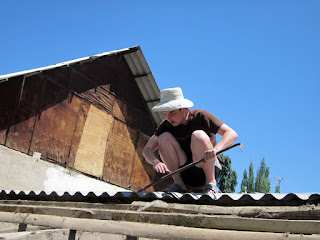
Met Kengeshbek-baike, my new host father, and stuffed his aging Nissan sedan full of my shit.
Snowboard bag couldn't fit, so we tied it down with an old rope and drove it a few miles to Kengeshbek-baike's friend's place, and dropped it in his big flatbed semi. He said his friend would drive it to Darkhan in a day or two.
Stopped at a bazar, picked up their son, Ulan (22). Didn't notice someone new had gotten in. Kengeshbek-baike, Gulnara-eje, Farida-eje (my counterpart), and Joomart are all in the car.
I'm sitting shotgun. We hit the road again.
We run a red light. Tired of waiting, I guess. Or no need.
On the open road, potholes here and there like landmines.
Kengeshbek-baike says the raods in Kyrgyzstan are bad, and asks me if the raods are bad in the US.
Sometimes, I say.
We hit a pothole at like 50 mph and I wonder if the car will hold up for the whole drive.
Tires are nearly bald and need air.
Windshield and mirrors are cracked.
We push on in silence.
Farida-eje and Gulnara-eje whisper quietly to each other in the back seat. Joomart is sick; he takes his medicine, cough syrup, without complaint.
''Good boy,'' I say to Keneshbek-baike.
''Kiiyiin bala,'' he replies. Difficult boy.
I close my eyes and doze off. There are no raod signs, no speed limit signs, no lines. Only names of towns and villages are marked.
We pass by a cop with a radar gun and an orange baton, like the ones used on airport runways to communicate with pilots when they're taxiing.
I wonder if he's going to pull us over, and what it means to be a foreigner. I left my ID in my bag, in the back, but I don't know how to say that in Kyrgyz.
He doesn't pull us over.
But, the next cop does. Keneshbek-baike pays the bribe, and we go free. The radar guns are bullshit. They pick cars at random, and wave their orange baton at them.
''You will pull over.''
They have families to feed.
''Politzia,'' Keneshbek-baike says, shaking his head.
We stop for gas. The attendant shakes her head. No. We pull away.
Down the road, we try again. No gas here, either.
Keneshbek-baike points out Kazakhstan to our left. The countries are separated by a river just off the road. We stop again for gas. This place has some. I pay for it.
Inside, the car is quiet. I doze off again. Keneshbek-baike asks me if I'm hungry, and some bread is passed up from the back, along with a one-liter bottle of peach soda or something, which we all share.
I wonder what diseases I might catch from these strangers, but decide not to worry about it.
We enter Balykchy and get our first view of Lake Issyk-Kul. It is big and blue, and then it is gone, as the road extends inland.
The mountains are getting bigger. They're shaped like wizard hats, and green. They remind me of Punta Bardini.
Keneshbek-baike points to our right and says, ''Cheena.'' China looks mountainous.
I have a few short texting conversations with some friends from PST as we drive along the South shore of the lake and the sun sets.
It is beautiful, and I hope Darkhan overlooks the lake.
We pass Barskoon and Kichi-Jargylchak, and I mention the volunteers who are living there.
Farida-eje confirms what I said, in English, and I feel that our partnership has begun.
It's dark when we drive into Darkhan. People are silouettes. A man walks with his arm around his buddy's shoulders; women hold hands. Totally normal.
We drop off Farida-eje. I'm told to stay in the car. I wanted to, but somehow we don't say goodbye to each other.
Ulan jumps into the driver's seat. I feel that something is different, but I don't realize he's not Keneshbek-baike at first.
Strange consequence of fatigue and stress that my situational awareness is fading.
I think maybe Ulan wants practice driving. I ask him if he's sixteen.
''Men Jirima-ekie,'' he says, and I felt like I should have known his was 22.
We pull into the driveway. He honks the horn. Nurgazy greets us, helps me with my bags while Keneshbek-baike shows me to my room.
I give him the rest of the 900 soms the Peace Corps gave me for transportation, and tell him it's for him. I could've pocketed it, but I wanted to start off on the right foot. No secrets. No guilt.
He didn't understand. ''Imnegay?'' he asked. Why?
For travel, I said.
I text the PC to tell them I made it to the village while his sons brought in the rest of my bags, and the groceries from the bazar.
Keneshbek-baike gives me a tour of the house, showing me the TV, radio, DVD player, the path to the outhouse and the light switch in the back yard.
Then I tune the guitar in the living room and play a few riffs.
Nurgazy plays a few notes, and it sounds much better than before, when it was out-of-tune.
I fill up my water filter with ''clean water'' from a stand pipe in the back yard, and brush my teeth.
Then I watch an episode of Lost called ''The Outsider''—He walks among us, but he is not one of us—and fall asleep.
That night, I had some of the craziest, most vivid dreams I have ever had in my life.









